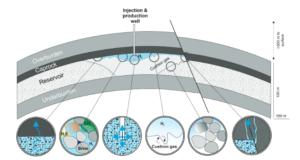Large-scale storage of hydrogen remains largely untested but is essential if hydrogen is to realise its potential to make a significant contribution to achieving net-zero emissions. A new perspectives paper, co-authored by HyStorPor researchers in collaboration with the GEO*8, a grouping of leading European earth sciences research organisations, and published in Energy & Environmental Science, sets out the key challenges and knowledge gaps in hydrogen storage and says there is an urgent need for multi-disciplinary research to address them.
Hydrogen is attracting global attention for its potential to help decarbonise transport, heating and energy-intensive industries, such as chemicals and steel-making. Critically, it can help alleviate a key drawback of renewable energy generation – its intermittency. Excess renewable energy can be converted to hydrogen through electrolysis (green hydrogen) and stored for use during periods of high -energy demand.

To facilitate hydrogen supply on the scale required for a zero-carbon future, it must be stored in underground porous rock geological formations, such as saline aquifers and depleted oil and gas hydrocarbon reservoirs, the paper says. Despite the substantial opportunity provided by such storage, the lack of research means it is associated with uncertainties and challenges, it notes.
“Low-carbon hydrogen has the potential to make a significant contribution to the decarbonisation of global energy systems,” says Dr Katriona Edlmann, a HyStorPor researcher at the University of Edinburgh and one of the paper’s authors. “Porous rock reservoir storage is the only means to provide sufficient scale for hydrogen energy storage around the world.”
The other authors include fellow HyStorPor researchers Dr Niklas Heinemann, Dr Mark Wilkinson and Professor Stuart Haszeldine. The paper was written in collaboration with the GEO*8, a grouping of leading European earth sciences research organisations.
“The paper evaluates the emerging research on hydrogen storage, identifying the key challenges that must be addressed to enable global deployment,” says Dr Heinemann. “It provides an authoritative account of the factors that make hydrogen storage in porous geological media unique and addresses the unknowns that are likely to set the research agenda in future.”


